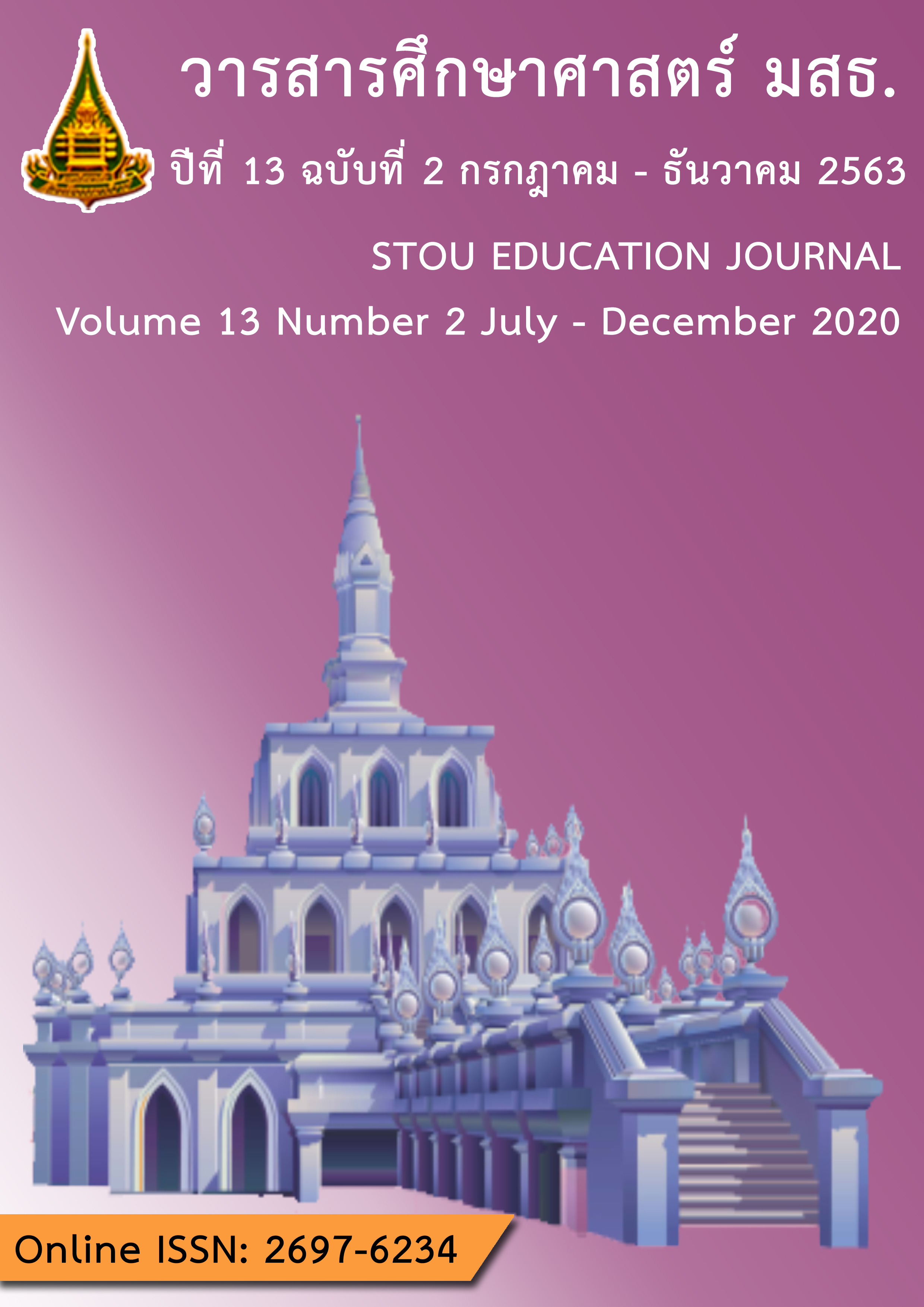การพัฒนาชุดกิจกรรมการเรียนการสอนวรรณคดีและวรรณกรรมไทยโดยใช้ กระบวนการกระจ่างค่านิยมเพื่อส่งเสริมความซื่อสัตย์ของ นักเรียนมัธยมศึกษาตอนต้น
Main Article Content
บทคัดย่อ
การวิจัยครั้งนี้มีวัตถุประสงค์เพื่อ 1) พัฒนาชุดกิจกรรมการเรียนการสอนวรรณคดีและวรรณกรรมไทยโดยใช้กระบวนการกระจ่างค่านิยมเพื่อส่งเสริมความซื่อสัตย์ของนักเรียนมัธยมศึกษาตอนต้น และ 2) ศึกษาผลของการใช้ชุดกิจกรรมการเรียนการสอนที่พัฒนาขึ้น กลุ่มเป้าหมาย คือ นักเรียนชั้นมัธยมศึกษาปีที่ 2 จำนวน 40 คนโรงเรียนมัธยมศึกษาขนาดใหญ่แห่งหนึ่งในจังหวัดกรุงเทพมหานคร โดยใช้การสุ่มแบบกลุ่ม เครื่องมือที่ใช้ในการวิจัย ได้แก่ ชุดกิจกรรมการเรียนการสอนวรรณคดีและวรรณกรรมไทยโดยใช้กระบวนการกระจ่างค่านิยม และแบบวัดความซื่อสัตย์ สถิติที่ใช้ในการวิเคราะห์ข้อมูลได้แก่ ค่าเฉลี่ย ส่วนเบี่ยงเบนมาตรฐาน และการทดสอบค่าที ผลการวิจัยสรุปได้ว่า 1) ชุดกิจกรรมการเรียนการสอนวรรณคดีและวรรณกรรมไทยโดยใช้กระบวนการกระจ่างค่านิยม ประกอบด้วยส่วนประกอบ 4 ส่วน คือ (1) คู่มือการใช้ชุดกิจกรรม (2) แผนการจัดกิจกรรมการเรียนการสอน จำนวน 4 ชุดกิจกรรม คือ ชุดที่ 1 เสียชีพดีกว่าเสียสัตย์ ชุดที่ 2 ซื่อกินไม่หมดคดกินไม่นาน ชุดที่ 3 ความซื่อความสัตย์ และ ชุดที่ 4 คำสัตย์วาจาของคนจริง (3) สื่อ การเรียนรู้ และ (4) แบบประเมิน 2) ผลของการใช้ชุดกิจกรรมการเรียนการสอนพบว่า นักเรียนที่ใช้ชุดกิจกรรมมีค่าเฉลี่ยความซื่อสัตย์หลังการทดลองสูงกว่าก่อนการทดลองอย่างมีนัยสำคัญทางสถิติที่ระดับ .05
Article Details
เอกสารอ้างอิง
กระทรวงศึกษาธิการ. (2551). หลักสูตรแกนกลางการศึกษาขั้นพื้นฐาน พุทธศักราช 2551. กรุงเทพมหานคร: โรงพิมพ์ชุมนุมสหกรณ์การเกษตรแห่งประเทศไทย.
กุสุมา รักษมณี. (2547). วรรณสารวิจัย. กรุงเทพมหานคร: แม่คำผาง.
ชัยพร วิชชาวุธ. (2530). จริยธรรมกับการศึกษา. กรุงเทพมหานคร: จุฬาลงกรณ์มหาวิทยาลัย.
นาตยา ปิลันธนานนท์. (2542). บทบาทของทฤษฎีการกระจ่างค่านิยมกับการศึกษา. ในไพฑูรย์ สินลารัตน์. ความรู้คู่คุณธรรม รวมบทความเกี่ยวกับคุณธรรม จริยธรรมและการศึกษา, น.167-180. กรุงเทพมหานคร: สำนักพิมพ์แห่งจุฬาลงกรณ์มหาวิทยาลัย.
บุญเหลือ เทพยสุวรรณ, มล. (2556). เบิกทางวรรณคดีศึกษาไทย. ภาควิชาภาษาไทย คณะอักษรศาสตร์ มหาวิทยาลัยศิลาปกร.
ศูนย์คุณธรรม. (2562, มิถุนายน 6). ผลการสำรวจสถานการณ์คุณธรรมของสังคมไทย ปี 2562. สืบค้นจาก https://www.moralcenter.or.th//สมัชชาคุณธรรม/การสำรวจสถานการณ์คุณธรรมของสังคมไทย.html.
สกล สุขสวัสดิ์ และ มนัสนันท์ น้ำสมบูรณ์. (2560). การพัฒนาค่านิยม ความรักชาติ ศาสนา และพระมหากษัตริย์ ที่จัดการเรียนรู้ด้วยกระบวนการกระจ่างค่านิยมของนักเรียนชั้นมัธยมศึกษาปีที่ 5. Veridian E-Journal, 10(2), 1040-1059.
สำนักงานคณะกรรมการพัฒนาการเศรษฐกิจและสังคมแห่งชาติ. (2559). แผนพัฒนาเศรษฐกิจและสังคมแห่งชาติ ฉบับที่ 12 พ.ศ. 2560–2564. สำนักนายกรัฐมนตรี.
สำนักงานคณะกรรมการการศึกษาแห่งชาติ สำนักนายกรัฐมนตรี. (2542). พระราชบัญญัติการศึกษาแห่งชาติ พ.ศ.2542 และที่แก้ไขเพิ่มเติม ฉบับที่ 2 พ.ศ. 2545. กรุงเทพมหานคร: พริกหวานกราฟฟิค.
สำนักงานเลขาธิการสภาผู้แทนราษฎร. (2558). วาระพัฒนาที่ 4:ระบบค่านิยม คุณธรรม จริยธรรม เพื่อความเป็น พลเมืองที่ดีและมนุษย์ที่สมบูรณ์. กรุงเทพมหานคร: สำนักงานเลขาธิการสภาผู้แทนราษฎร.
Rath, L. E, Harmin, M., & Simon, S. B. (1996). Values and teaching: Working with value in classroom. Ohio: Charles E. Merrill Books.


